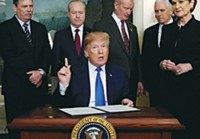Advertisement
Grab your lab coat. Let's get started
Welcome!
Welcome!
Create an account below to get 6 C&EN articles per month, receive newsletters and more - all free.
It seems this is your first time logging in online. Please enter the following information to continue.
As an ACS member you automatically get access to this site. All we need is few more details to create your reading experience.
Not you? Sign in with a different account.
Not you? Sign in with a different account.
ERROR 1
ERROR 1
ERROR 2
ERROR 2
ERROR 2
ERROR 2
ERROR 2
Password and Confirm password must match.
If you have an ACS member number, please enter it here so we can link this account to your membership. (optional)
ERROR 2
ACS values your privacy. By submitting your information, you are gaining access to C&EN and subscribing to our weekly newsletter. We use the information you provide to make your reading experience better, and we will never sell your data to third party members.
Pharmaceuticals
U.S. slams China, India, and others over weak patent protection
by Glenn Hess, special to C&EN
May 15, 2017
| A version of this story appeared in
Volume 95, Issue 20
The Trump Administration is sharply criticizing India, China, Indonesia, and several other countries it says are not properly enforcing and protecting the intellectual property rights of U.S. drugmakers and other businesses. In a congressionally required annual report released in late April, the Office of the U.S. Trade Representative (USTR) placed 11 countries on a “priority watch list” for their perceived intellectual property rights abuses, such as failing to prevent the export of counterfeit drugs and inadequately enforcing patents. The report says nearly 90% of counterfeit medicines seized at the U.S. border in fiscal 2016 came from China, Hong Kong, India, and Singapore. USTR says U.S. pharmaceutical companies remain concerned about the potential threat posed to their intellectual property through the Indian government’s possible use of compulsory licensing, which allows local firms to override patents and make cheaper generic copies of brand-name drugs. The report singles out China for its “coercive” technology transfer requirements, structural barriers to effective IPR enforcement, and “widespread infringing activity,” including trade secret theft.



Join the conversation
Contact the reporter
Submit a Letter to the Editor for publication
Engage with us on Twitter